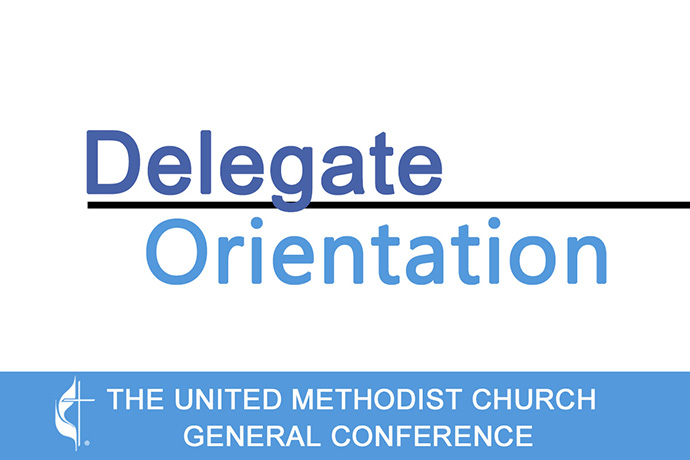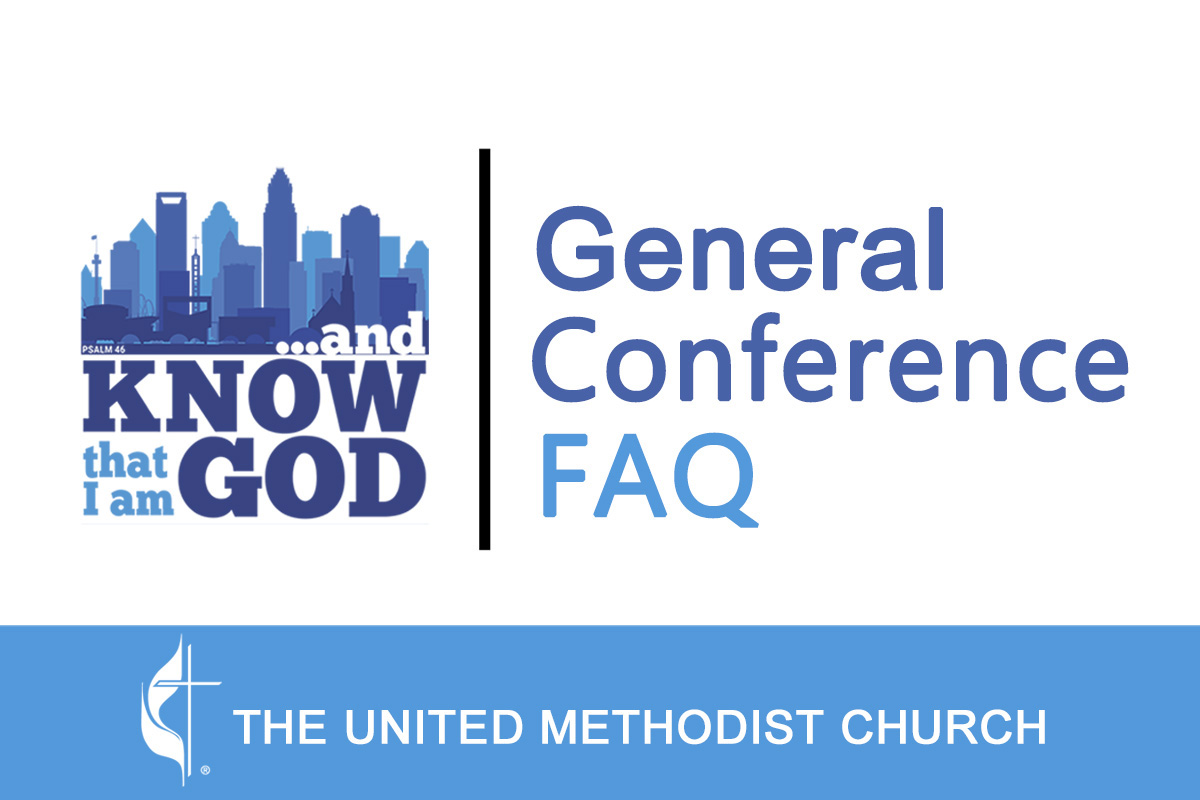Key Points:
- Because of the pandemic, the last regular session of General Conference was nearly eight years ago.
- General Conference is the only body that can speak for the whole United Methodist Church.
- It has the authority to make revisions to the denomination’s Book of Discipline and Book of Resolutions.
The United Methodist Church has no pope.
But it does have a General Conference — the only body that can set official policy and speak for the international denomination.
General Conference brings together lay and clergy delegates from four continents whose decisions will affect how millions of United Methodists do church for years to come.
Think of the two-week gathering as a combination of a United Nations General Assembly, a U.S. congressional session and a time of rousing Christian worship.
The coming General Conference, now scheduled for April 23-May 3 in Charlotte, North Carolina, comes at a particularly momentous time.
General Conference typically gathers every four years. But because of the COVID pandemic, the assembly could not meet in 2020. That means the last regular session was in May 2016 — nearly eight years ago.
In the interim, the denomination has seen a quarter of its U.S. churches depart under a disaffiliation policy that began in 2019 and expired at the end of 2023.
What comes next for the international denomination will be largely up to General Conference itself.
Here are answers to frequently asked questions about the big event.
What does General Conference do?
General Conference is the denomination’s highest legislative body. As such, it has the authority to make revisions to the denomination’s Book of Discipline and Book of Resolutions.
The Discipline is the denomination’s governing document that contains its doctrine, constitution, church law, rules of organization and procedures. The Book of Resolutions contains the denomination’s positions on current social issues. Resolutions expire after eight years unless General Conference readopts them.
General Conference approves the four-year budget allocating apportionments — shares of church giving — for denomination-wide ministries around the globe. General Conference also sets the formula used for apportioning the budget to annual conferences, the denomination’s regional bodies, which in turn ask for apportionments from local churches.
In addition, the assembly approves theological statements on subjects such as baptism and communion. The coming General Conference will consider adopting a theological statement on the United Methodist understanding of church titled “Sent in Love.”
General Conference also elects members of the Judicial Council, the denomination’s top court; members of the commission that plans General Conference; and some members of other denominational leadership bodies.
The Judicial Council will be on hand throughout General Conference to weigh in on questions about General Conference actions including whether legislation is in line with the denomination’s constitution.
Who can propose legislation to General Conference?
The Book of Discipline states that any United Methodist organization, clergy member or lay member may submit a General Conference petition — basically the United Methodist equivalent of a bill before a legislature.
All told, the coming General Conference has received 1,099 total valid petitions — including 352 new petitions submitted since General Conference’s delay in 2020.
Some of those petitions were submitted by people who have since left The United Methodist Church. The Rev. Gary Graves, General Conference secretary, plans to provide a report at the start of General Conference identifying those petitions.
Where can people see what legislation is under consideration?
The Advance Daily Christian Advocate contains the petitions and reports that will be before delegates. The Advance Daily Christian Advocate is available in PDF form.
People also can subscribe online to the Daily Christian Advocate at DailyChristianAdvocate.org. The website includes the proposed legislation and will include the daily proceedings. General Conference delegates and first reserves receive free access to the site. Others may access it for a one-time fee of $49.99.
United Methodist Communications and Graves also will offer an overview of some of the legislation before delegates during a livestreamed orientation from 9 a.m. to 1 p.m. U.S. Central time Feb. 29 and March 1. The stream will be available in English, French and Portuguese.
Pre-General Conference briefing

Who votes at General Conference?
The coming General Conference plans to have 862 voting delegates — half clergy and half lay.
Of the elected delegates, 55.9% are from the U.S., 32% from Africa, 6% from the Philippines, 4.6% from Europe (including Russia) and the remainder from concordat churches that have close ties to The United Methodist Church. General Conference organizers are working to help delegates obtain the needed visas to attend.
Interpreters will support this multinational and multicultural body in nine languages including American Sign Language. Written materials will be available in the four official General Conference languages: English, French, Kiswahili and Portuguese.
How are the delegates chosen?
Annual conferences — the denomination’s regional bodies consisting of lay and clergy voters from multiple churches — each elect an allotment of delegates. The United Methodist Church’s constitution requires that laity elect the lay delegates, and clergy elect their fellow clergy.
The United Methodist Church’s constitution also mandates that each annual conference gets at least two General Conference delegates — one lay and one clergy. Beyond this mandatory minimum, conferences are allotted their delegate slates using a formula based on their lay and clergy membership numbers. The delegation allocations for the coming General Conference in Charlotte are based on the membership data available in 2017, well before the COVID pandemic upended so much of church life.
Most annual conferences also elect reserves who participate in General Conference as needed to assure that each annual conference is fully represented throughout the session.
The denomination currently has 53 annual conferences in the U.S., and 80 annual conferences in Africa, Europe and the Philippines. But at the time of delegate elections in 2018 and 2019, two U.S. conference mergers had yet to take effect. That means the four legacy conferences involved in those mergers will each seat a delegation in Charlotte.
What is the role of bishops at General Conference?
United Methodist bishops have a limited role during the assembly.
They preside at General Conference sessions but do not have voice or vote. This means they cannot make motions or advocate for positions from the floor.
Bishops do preach during worship. South Carolina Conference Bishop L. Jonathan Holston also will deliver the episcopal address on behalf of the Council of Bishops.
However, bishops usually know well the delegate experience. Many previously served as delegates themselves before their election to the episcopacy.
How often do those attending join in worship?
General Conference opens and closes with Christian worship. Worship services also open each day’s proceedings, often with bishops preaching. On April 28 — the Sunday of General Conference — delegates and others at the gathering are encouraged to attend services at local United Methodist churches. Charlotte is home to multiple United Methodist congregations.
How does legislation become church law?
The first stop for legislation under consideration at the coming General Conference is one of 14 legislative committees or the Standing Committee on Central Conference Matters. The standing committee is a permanent General Conference committee that deals with matters pertaining to church regions in Africa, Europe and the Philippines.
Petitions approved by committee then move on to the full body of delegates for possible further revision and a vote.
The Book of Discipline requires that all petitions must receive a vote in their assigned committee and all legislation approved by a committee must receive a vote by the full General Conference plenary.
It is possible for legislative committees and the plenary to vote down multiple petitions in bulk. Likewise, the General Conference plenary can approve multiple petitions in bulk if they qualify for the consent calendar.
Delegates routinely pray over their decision-making. They are to vote based on their own conscience as moved by the Holy Spirit.
What percentage of votes does legislation need to pass?
Most legislation requires only a simple majority of General Conference delegates to pass.
Amendments to the denomination’s constitution require a two-thirds vote of the General Conference followed by a two-thirds aggregate vote of the lay and clergy members present and voting in the annual conferences.
Changes to the denomination’s doctrinal standards, which includes basic Christian tenets such as belief in Christ’s resurrection and the Trinity, require at least a two-thirds vote of the General Conference followed by three-fourths aggregate vote of the lay and clergy members present and voting in the annual conferences.
The United Methodist Church has never altered its doctrinal standards before, and no proposals before the coming General Conference seek to alter them.
When does newly passed legislation take effect?
Legislation approved by the coming General Conference will become effective Jan. 1 next year, unless otherwise specified.
However, amendments to the denomination’s constitution only take effect after the Council of Bishops certifies their ratification. In practice, that means any new amendment will not take effect until the bishops meet in spring 2026.
Hahn is assistant news editor for UM News. Contact her at (615) 742-5470 or newsdesk@umcom.org. To read more United Methodist news, subscribe to the free Daily or Friday Digests.




